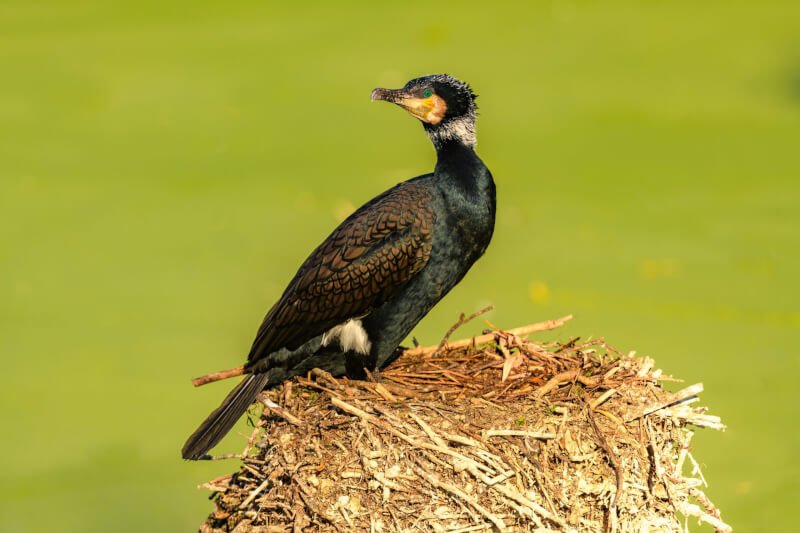Do you want to ensure the health and well-being of your beloved bird? Providing a balanced and nutritious diet is essential in keeping your feathered friend happy and thriving. By understanding their dietary needs and carefully selecting a variety of foods, you can create a well-rounded meal plan that meets all their nutritional requirements. From fresh fruits and vegetables to high-quality pellets and seeds, your bird will benefit from a diverse and wholesome diet that promotes optimum health. Let’s explore some tips and tricks on how you can provide a balanced and nutritious diet for your bird, ensuring they live a long and vibrant life.

Understanding the Nutritional Needs of Birds
Birds have unique dietary requirements that vary depending on their species. It is essential to understand these requirements to provide a balanced and nutritious diet for your feathered friend. Different types of birds have different dietary needs, which can include various types and amounts of nutrients. By familiarizing yourself with the nutritional needs of birds, you can ensure that your bird receives the proper diet it needs to thrive.
Different Types of Birds Have Different Dietary Requirements
Birds can be classified into different groups based on their dietary preferences. Some birds are herbivores, relying mainly on plant-based foods, while others are omnivores and consume both plants and animals. Additionally, some birds are carnivores, subsisting primarily on a meat-based diet. Understanding the dietary preferences of your bird’s species will help you determine the types of foods to include in its diet.
Essential Nutrients for Birds
Just like humans, birds require a balance of essential nutrients to maintain their health and well-being. These nutrients include proteins, carbohydrates, fats, vitamins, minerals, and water. Proteins are essential for building and repairing tissues, while carbohydrates provide energy. Fats, vitamins, and minerals play various roles in maintaining bodily functions. Water is particularly crucial for birds, as it aids in digestion, circulation, and temperature regulation. Ensuring that your bird’s diet includes all these essential nutrients is vital for its overall health.
Understanding the Digestive System of Birds
To provide a suitable diet for your bird, it is essential to understand how its digestive system works. Birds have a unique digestive system that enables them to efficiently process their food. Unlike mammals, birds lack teeth and chew their food in their beaks. Once swallowed, the food enters the crop, where it is temporarily stored before moving on to the stomach. The stomach has two parts, the proventriculus, which produces digestive enzymes, and the gizzard, which mechanically breaks down the food. From there, the food passes through the intestines, where the absorption of nutrients occurs. Understanding this process will help you select foods that are easily digestible for your bird.
Natural vs. Commercial Bird Food
When it comes to providing a balanced and nutritious diet for your bird, there are two main options: natural bird food and commercial bird food. Each option has its advantages and disadvantages, and finding the right balance between the two is key.
Advantages of Natural Bird Food
Natural bird food refers to fruits, vegetables, seeds, and other fresh foods that are found in nature. Choosing natural bird food allows you to provide your bird with a variety of fresh and unprocessed options. Natural foods often contain more nutrients and fewer additives compared to commercial bird food. Additionally, offering natural foods can provide mental stimulation and mimic a bird’s natural foraging behaviors.
Advantages of Commercial Bird Food
Commercial bird food, such as pellets and formulated diets, offers convenience and simplified nutrition. These foods are specifically designed to meet the nutritional needs of birds and often contain a balanced combination of nutrients. Commercial bird food can be particularly useful for bird owners who may not have access to a wide variety of fresh foods or want to ensure their bird receives a consistent and complete diet.
Finding the Right Balance
Finding the right balance between natural and commercial bird food is crucial. While natural foods provide diversity and enrichment, commercial bird food can ensure your bird receives a nutritionally complete diet. It is recommended to offer a combination of both types of food to provide a well-rounded diet. Consulting with a veterinarian or avian nutritionist can help you determine the best balance of natural and commercial bird food based on your bird’s specific needs.
Providing a Variety of Fresh Foods
Incorporating a variety of fresh foods into your bird’s diet is essential for providing a balanced and nutritious diet.
Incorporating Fruits and Vegetables
Fruits and vegetables are excellent sources of vitamins, minerals, and antioxidants. They not only provide essential nutrients but also add variety and color to your bird’s diet. Some suitable options for birds include carrots, kale, bell peppers, apples, and berries. It is important to wash fruits and vegetables thoroughly and remove any seeds, pits, or potential toxins before offering them to your bird.
Selecting Healthy Grains and Legumes
Grains and legumes, such as quinoa, brown rice, lentils, and chickpeas, are rich in carbohydrates and protein. These foods can be cooked and offered to your bird as a nutritious addition to their diet. Make sure to cook grains and legumes thoroughly and avoid using excessive seasonings or additives that may be harmful to your bird’s health.

Offering Protein-Rich Foods
Protein is an essential nutrient for birds, especially omnivorous and carnivorous species. In addition to commercial bird food, you can provide your bird with protein-rich foods such as cooked chicken, eggs, and insect larvae. It is important to ensure that any protein sources offered are thoroughly cooked and free from seasoning or additives that may be harmful to your bird.
Including Healthy Fats in the Diet
Healthy fats are an important component of a bird’s diet and play a role in energy production, vitamin absorption, and the maintenance of healthy feathers and skin. Some sources of healthy fats for birds include nuts, seeds, avocados, and coconut. However, it’s crucial to offer these in moderation, as excessive fat intake can lead to obesity and other health issues.
Avoiding Harmful Foods and Substances
Certain foods and substances can be toxic or harmful to birds and should be avoided.
Toxic Foods for Birds
Some common foods that are toxic to birds include chocolate, avocado, onions, garlic, caffeine, alcohol, and certain types of houseplants. These foods can cause a range of health issues, from digestive problems to organ damage. It is essential to research and familiarize yourself with potential toxic foods and ensure they are kept out of your bird’s reach.
Harmful Substances to Avoid
In addition to toxic foods, there are other substances that can be harmful to birds. These include tobacco smoke, household cleaning products, insecticides, and certain types of metals, such as lead. It is crucial to create a safe environment for your bird and keep them away from these potentially harmful substances.
The Dangers of Overfeeding
Overfeeding can lead to obesity, malnutrition, and other health issues in birds. It is important to provide your bird with the correct portion sizes and avoid excessive treats or high-calorie foods. Monitoring your bird’s weight and adjusting their diet as needed can help prevent overfeeding and maintain their overall health.
Supplementing the Diet with Nutritional Additives
In some cases, it may be necessary to supplement your bird’s diet with nutritional additives to ensure they are receiving all the necessary nutrients.
Introduction to Nutritional Additives
Nutritional additives are products specifically designed to provide additional nutrients to your bird’s diet. These can come in the form of powders, liquids, or tablets. Common additives include calcium supplements, vitamin supplements, probiotics, and omega-3 fatty acids. Before introducing any additives to your bird’s diet, it is crucial to consult with a veterinarian to determine which ones are appropriate for your bird’s specific needs.
Common Nutritional Additives for Birds
Calcium supplements are often provided to birds to support bone health, while vitamin supplements can help fill any potential gaps in their diet. Probiotics can promote a healthy gut flora, and omega-3 fatty acids can support cardiovascular health and promote healthy feathers. It is important to follow the recommended dosage and administration guidelines when using nutritional additives.
Consulting a Veterinarian for Supplement Recommendations
Consulting a veterinarian who specializes in avian medicine is highly recommended when considering introducing nutritional additives to your bird’s diet. They can help assess your bird’s specific nutritional needs and recommend appropriate supplements based on their health, species, age, and dietary requirements.
Understanding the Importance of Water
Water is a vital component of a bird’s diet and plays numerous essential roles in their overall health and well-being.

The Vital Role of Water in a Bird’s Diet
Birds rely on water for various bodily functions, including digestion, circulation, temperature regulation, and waste elimination. It is crucial to provide your bird with access to fresh and clean water at all times to ensure they are adequately hydrated.
Providing Fresh and Clean Water
Make sure to provide your bird with fresh water daily. Water should be changed regularly, and the water container should be cleaned to prevent the growth of bacteria or other harmful pathogens. A bird’s water container should be placed in an easily accessible location within their enclosure to encourage regular drinking.
Importance of Hydration
Maintaining proper hydration is essential for a bird’s overall health. Signs of dehydration in birds include excessive panting, fluffed feathers, loss of appetite, and dry or discolored droppings. If you notice any of these signs, it is crucial to provide your bird with immediate access to water and seek veterinary advice if symptoms persist.
Establishing a Feeding Schedule
Establishing a feeding schedule is essential for maintaining a balanced and consistent diet for your bird.
Determining the Right Amount of Food
The amount of food your bird requires will depend on factors such as its species, size, age, and activity level. It is important to feed your bird an appropriate portion size to prevent both underfeeding and overfeeding. Consulting a veterinarian or avian nutritionist can help you determine the ideal amount of food to provide for your bird.
Creating a Consistent Feeding Routine
Birds thrive on routine, so it is beneficial to establish a consistent feeding schedule. Feeding your bird at the same times each day can help regulate their appetite and digestion. Additionally, providing meals in a calm and quiet environment can create a positive feeding experience and reduce stress for your bird.
Monitoring and Adjusting the Diet as Needed
Monitoring your bird’s health and dietary response is essential for maintaining their overall well-being. Regularly observe your bird’s behavior, weight, and droppings to ensure they are healthy and satisfied with their diet. If you notice any changes or concerns, such as weight loss, decreased appetite, or abnormal droppings, consult with a veterinarian for further guidance.
Taking into Account Individual Bird Preferences and Needs
Every bird is unique, and taking into account their individual preferences and needs is crucial when providing a balanced and nutritious diet.
Observing and Understanding Your Bird’s Behavior
Observe your bird’s behavior during mealtime to understand their preferences and dietary needs. Some birds may have specific food preferences, while others may exhibit allergies or sensitivities to certain foods. Paying attention to your bird’s reactions and adjusting their diet accordingly can help ensure they are receiving the foods they enjoy and tolerate well.
Customizing the Diet Based on Species
Different bird species may have specific dietary requirements or restrictions. For example, seed-eating birds may require a mix of different seeds, while insect-eating birds may benefit from live insects or insect larvae. Researching the dietary preferences of your bird’s species and consulting with avian experts can help you customize their diet to meet their specific needs.
Adjusting the Diet for Age and Activity Level
As birds age or their activity levels change, their dietary needs may also fluctuate. Young birds may require a diet higher in proteins and fats to support their growth, while older birds may benefit from a diet lower in calories to maintain a healthy weight. Similarly, highly active birds may require additional energy sources compared to sedentary birds. Adjusting your bird’s diet to accommodate their changing needs is essential for their long-term health.
Monitoring the Bird’s Health and Dietary Response
Regularly monitoring your bird’s health and dietary response is crucial for identifying any potential issues or deficiencies.
Signs of a Healthy Diet
A healthy diet should support your bird’s overall well-being. Signs of a healthy diet include a glossy and vibrant plumage, a healthy weight, regular and well-formed droppings, and a good appetite. Additionally, birds on a healthy diet should be active, alert, and exhibit a curious and playful behavior.
Common Dietary Issues and Deficiencies
Poor diet can lead to various health issues and deficiencies in birds. Some common issues include obesity, malnutrition, vitamin deficiencies, and feather abnormalities. If you notice any changes or concerns with your bird’s health or appearance, it is crucial to seek veterinary advice for appropriate diagnosis and treatment.
Seeking Veterinary Advice when Needed
If you have any concerns or questions regarding your bird’s diet, it is always best to seek professional advice from a veterinarian specializing in avian medicine. They can provide tailored recommendations based on your bird’s specific needs and help address any dietary issues or health concerns effectively.
Conclusion
Providing a balanced and nutritious diet for your bird is essential for its overall health and well-being. By understanding the nutritional needs of birds, offering a variety of fresh foods, avoiding harmful substances, and monitoring your bird’s health and dietary response, you can ensure that your feathered friend receives the proper nutrition it needs to thrive. Remember to consult with a veterinarian or avian nutritionist for personalized guidance and recommendations to meet your bird’s specific dietary requirements. With a well-rounded diet, your bird will have the foundation for a long and healthy life.


